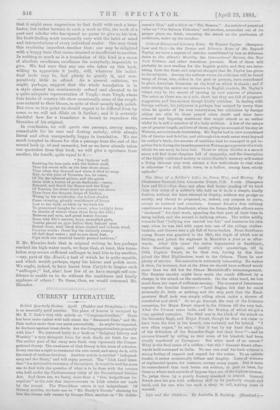The Story of a Soldier's Life ; or, Peace, War,
and Mutiny. By Lieutenant.General John Alexander Ewart, C.B. 2 vols. (Sampson Low and Co.)--One does not often find better reading of its kind than this story of a soldier's life, told as it is, in a simple, kindly fashion, without the least attempt at display, without any grudge to satisfy, any theory to propound, or, indeed, any purpose to serve,. except to instruct and entertain. General Ewart's first military experiences were at Sandhurst, where the future British officers were " hardened " for their work, spending the first part of their time in being bullied, mid the second in bullying others. The writer mildly remarks that "bullying was carried too far," and instances his own case, when he was tied with ropes into one of the college clothes- baskets, and thrown into a pit full of furzo-bushes. From Sandhurst young Ewart was gazetted to the 350, the depot of which was at Stirling, and joined the regiment in Mauritius a year or so after- wards. After this came the senior department at Sandhurst',. then Mauritius again, and sundry ether quarterings, till in 1853, Captain Ewalt, as be then was, having by this time joined the 93rd Highlanders, went to the Crimea. There he saw Plenty of service. His narrative is extremely interesting. He makes it clear, for instance, that at the Alma we should have suffered much more than we did but for Prince Mentehikoff's mismanagement. The Russian cavalry might have made the result different by a charge, in the attack on the earthwork. On the other hand, we lost much from the want of sufficient cavalry. The account of Inkermann repeats the familiar features :—" Lord Raglan felt that he could personally do little or nothing, and the only part that the Head- quarters' Stuff took was simply riding about uoder a shower of round-shot and shell." So we go through the rest of the Crimean campaign, for Major Ewart stayed in the Crimea till the very last. After the Crimea came India, and the Mutiny, of which we get a very spirited narrative. The 93rd was in the thick of the attack on the Secunder.Bagh, and Major Ewart, though he does not claim to have been the first in the breach, was certainly not far behind. "I now often regret," he says, "that it was by my hand that eight of the defenders of the Secunder-Bagh lost their lives l"—and he excuses himself by telling us that some of his kinsfolk had been cruelly murdered at Cawnpore. But what need of an excuse ?` What is the final cause of a soldier,—but this ? General Ewart after- wards held command in India. No one can read hie book without a
strong fooling of respect and regard for the writer. To an outside reader, it seems occasionally diffuse and lengthy. Lists of winners at regimental sports, for instance, occupy niany pages. But it must be remembered that such books are written, in part at least, for those to whom such records of bygone days are of the highest interest.
To judge them by a purely literary standard is absurd. Genera, Ewart uses his pen with sufficient skill to be perfectly simple and lucid, and for one who has such a story to toll, nothing more is wanted.


































 Previous page
Previous page